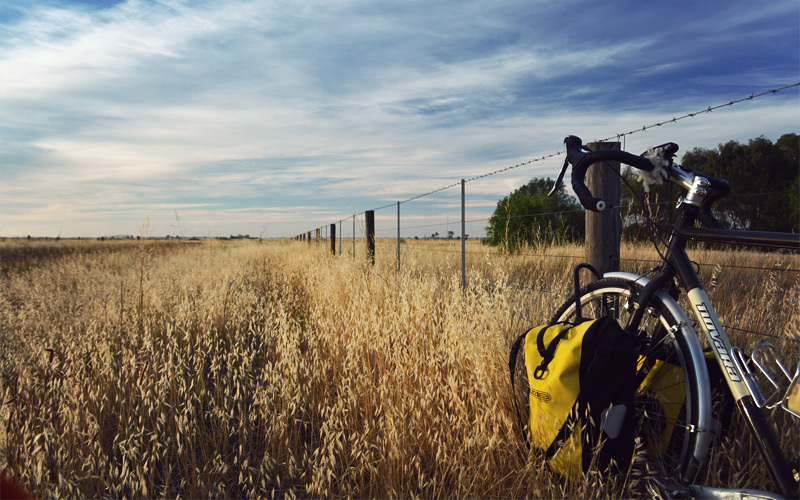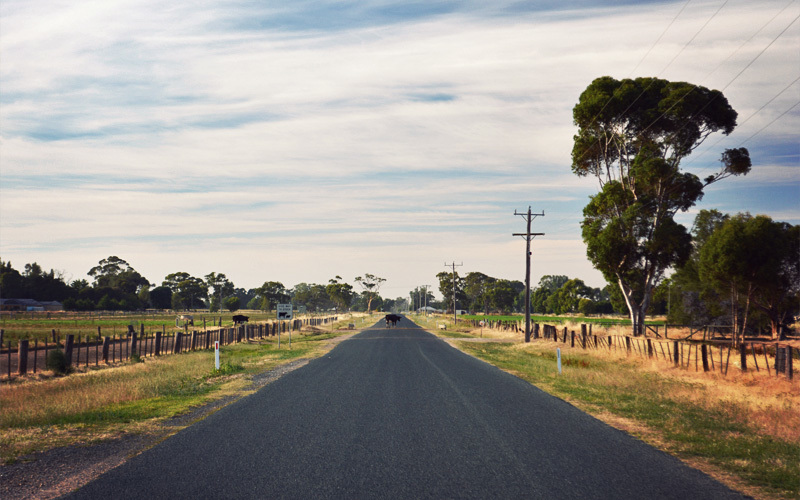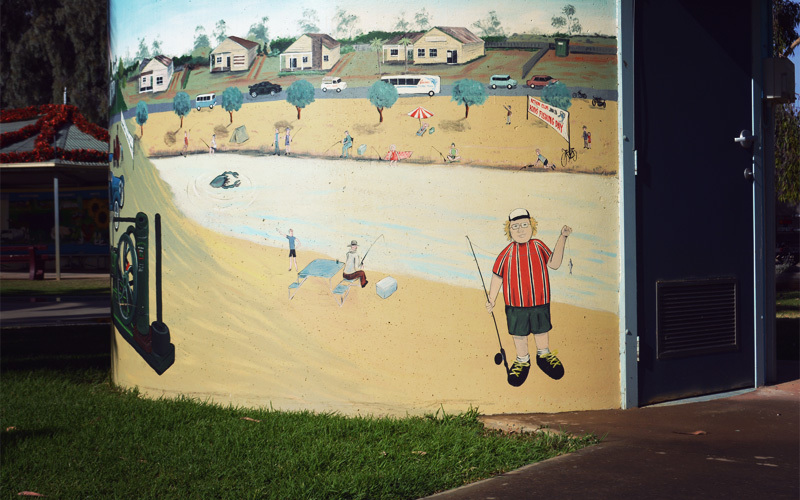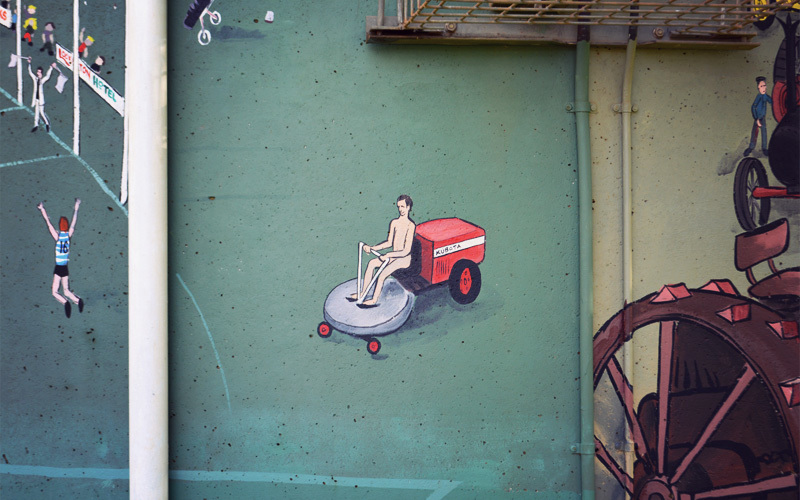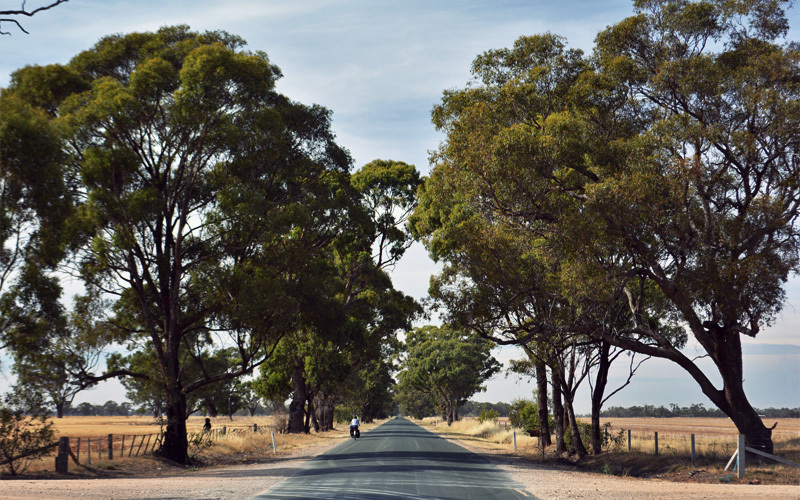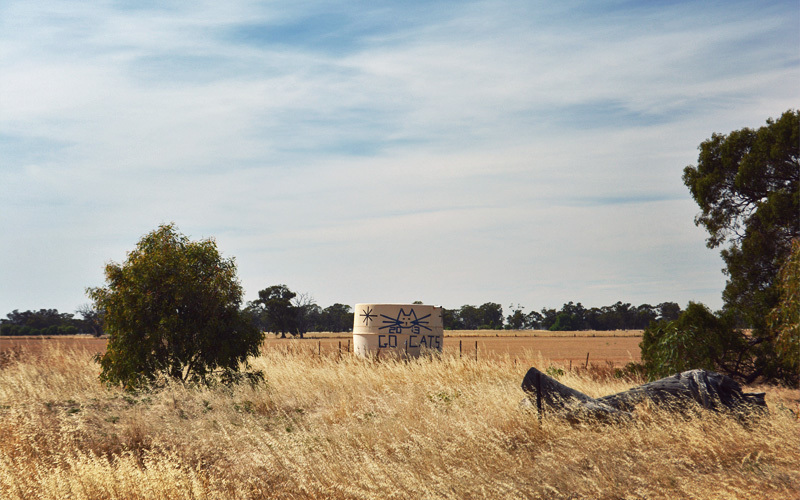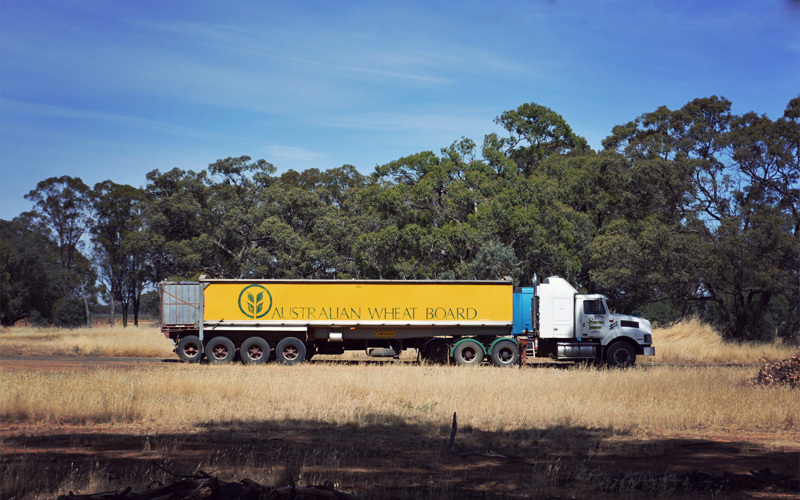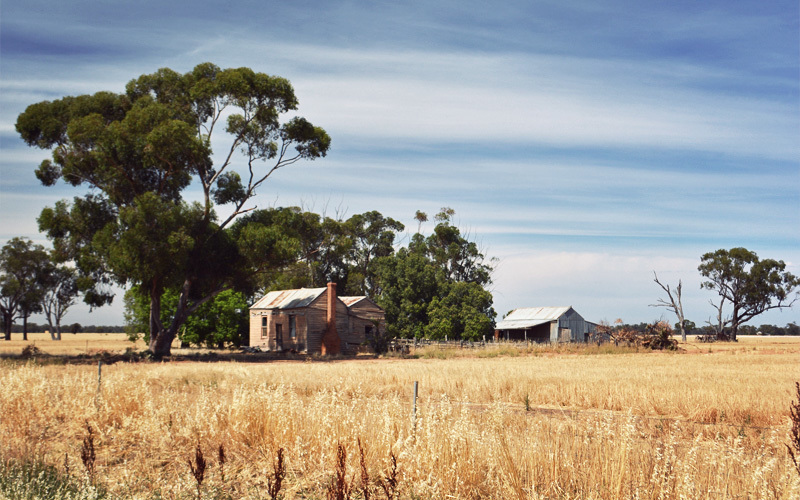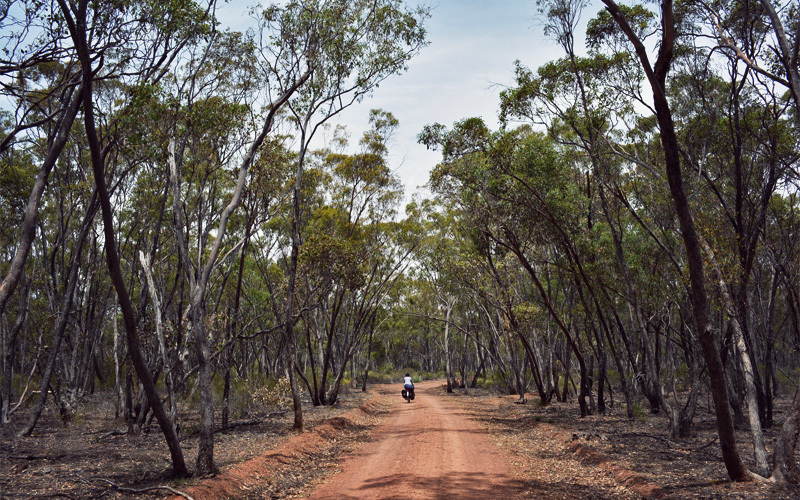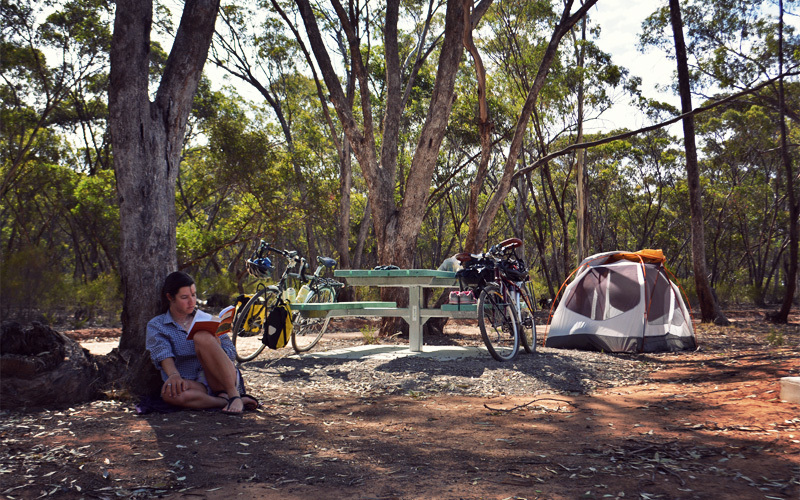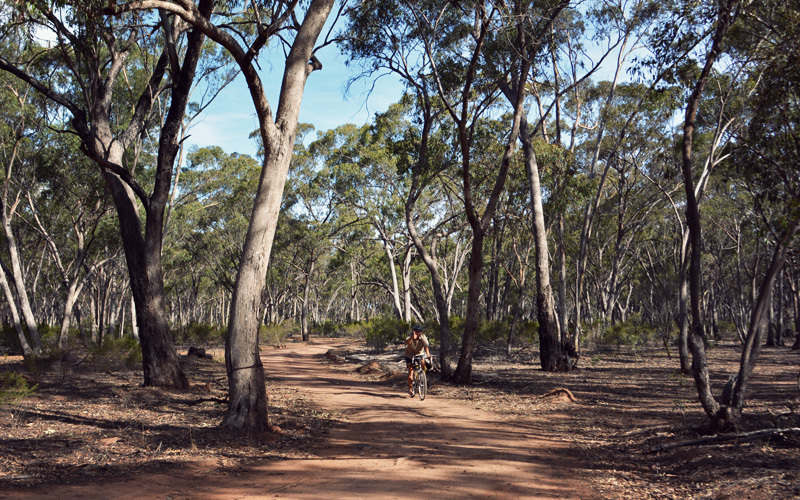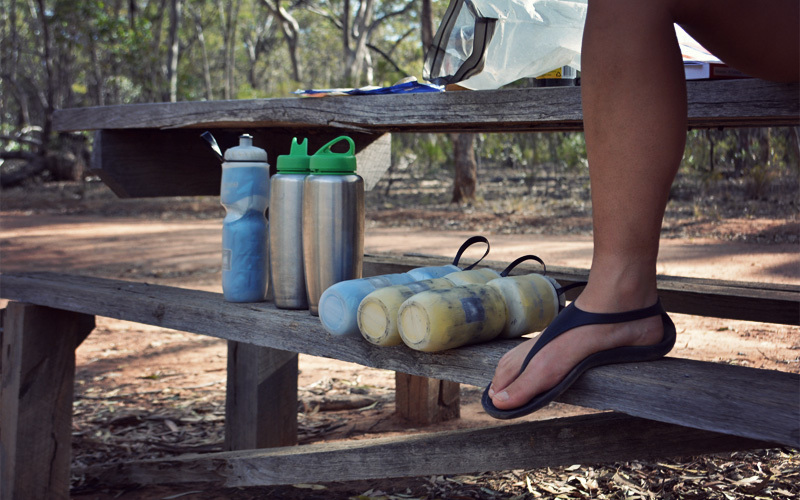January 1, 2015
Day 128: Near Lockington, VIC to Greater Bendigo National Park
Only one car passes on the dirt road that runs parallel to our tent. It happens some time around midnight, but the driver is either to drunk to notice or too disinterested to care about the tent and two bicycles that stand lit up by the near-full moon out in the middle of a sea of farm fields. The night is otherwise so quiet and still that we wake up to find a fine layer of condensation of sitting on top of every flat surface.
The roads are all but empty on this holiday morning, but the work to be done on the dairy farms never stops. At the first place we pass, the farmer walks behind the herd with a tall stick, calling out Go! and Hup! and Git! as he guides them into the milking barn. At the next, the process is already done and the farmer stands in one spot in his overalls and gumboots spraying down the concrete floor with a high-powered hose. There's no one to be seen at the farm after that. The cows have become so familiar with the morning milking ritual that they walk from one paddock to the next, crossing the paved road between the fields all on their own, at whatever pace they feel like.
Beyond Lockington we travel south on a smooth and quiet road where there's so little traffic they never bothered to put down center stripes. With the wind gone, we ride at eleven and twelve miles per hour without much effort past rusted windmills an old homesteads in various stages of decay. Cylindrical hay bales by the hundreds lay on their sides in the fields, and we see reddish-brown soil wherever the grass cover has been stripped away. The riding is easy, our spirits are high again, and we talk for hours as we pedal side by side.
Late in the morning things get exciting. First we pass over a creek. Then we pass over another creek. Then the road picks up these tiny rolling hills that rise at one and sometimes two percent grades. And every now and then the wheat changes color slightly as one massive swath of fields gives way to the next. It's riveting stuff.
When we cross the invisible line that marks the northern edge of the Greater Bendigo National Park, the landscape changes entirely. Gone are the farms and hay lofts and giant plastic water tanks, and in their place stands a native forest of eucalyptus trees that extends off from both edges of the road into what seems like forever. It's a rare look into what Australia used to be, and we decide that it's something we're not content to pass through in half an hour on the way to the next town. Instead we pull off down a road carved out of red dirt, head half a mile into the woods, and come to a stop in a clearing next to a tiny rain-fed pond.
Puffs of dust hang in the air inside the tent when I untie my shoelaces. Laying on my stomach and looking out through both the dirt cloud and the mesh, I follow the flight path of birds small enough to fit in the palm of my hand. They weigh so little that when they land on a reed that hangs parallel to the surface of the pond, the added pressure only causes the reed to lean down toward the water by another thirty degrees, not fall all the way into it as I'd been certain it would. Over the course of the afternoon and evening we watch hundreds of different birds of half a dozen types swoop in toward the pond, stop to take a quick drink, and then fly off in between the low-hanging branches where they disappear within seconds.
We also dream of cold water, cold cider, and cold beer. Because we hadn't planned to camp here, and figured we'd fill our water bottles in the town ten miles down the road, we find ourselves with less than two small bottles each for the next fifteen hours. We promise to ration what's left, but we sweat in the heat of the day even while sitting still, and by early evening we're down to one apiece. If we ever find ourselves in a true survival situation, we might as well lay down on the ground and let the snakes and spiders take us, because left to our own conservation strategies we're just as hopeless.
"This is stupid," I say to Kristen an hour later. "I can see a farm field right over there at the end of the tree line. I'm just going to go ride over and see if anyone's there and ask for some water."
This is how I meet Bruce and Dot. They're a retired couple in their late fifties who seem as happy as anything to let a complete stranger from America who rides up to their farm house on a bicycle come right into the kitchen and fill up six huge water bottles. As we stand around and talk for twenty minutes about traveling across Australia by both bicycle and by camper van, about the weather, and about freedom camping, I realize how silly it is that Kristen and I debated whether or not to ask for help in the first place. Western media forever tells us how dangerous the world is, how terrible fates lie in wait for us if we aren't careful and vigilant, and how it's unsafe to trust someone you don't already know. There are narrow slices of the world for which this advice is sound, but that isn't the world that most of us live in. Traveling by bicycle in the way we do has helped us start to unlearn these lessons little by little, and both this adventure and our souls have been enriched because of that.
But I still don't trust the goanna. It's a five-foot-long lizard with sharp claws that climbs trees, and that on rare occasions will attack a human, which is all you need to know about why it's fucking terrifying. On the way back to the campsite I hear a noise in the brush off to my left, then a moment later see a huge black thing hauling ass straight up a tree about a hundred feet into the woods. This, it turns out, is a sure-fire way to make my eyes turn huge and my asshole clench very tight, very fast.
We rehydrate and eat dinner and the heat of the day fades, leaving behind nothing for us to worry about. Laying on my side on the air mattress in the tent, I think about how in wide-open country like this there's a tendency to want to make miles, to reach the next town, to see how quickly you can make huge expanses of land become little spots in your rear view mirror. But when distance becomes the goal, distance becomes the tour, and distance starts to color the thought process behind every decision. As we sit alone listening to the chirping of the birds and the clicking of the insects, with the sky colored in soft pastel shades, I'm reminded how focusing on speed and mileage — more than the heat, more than talking to strangers, more than goannas — is what we should be most afraid of.
Today's ride: 39 miles (63 km)
Total: 3,951 miles (6,359 km)
| Rate this entry's writing | Heart | 3 |
| Comment on this entry | Comment | 0 |
